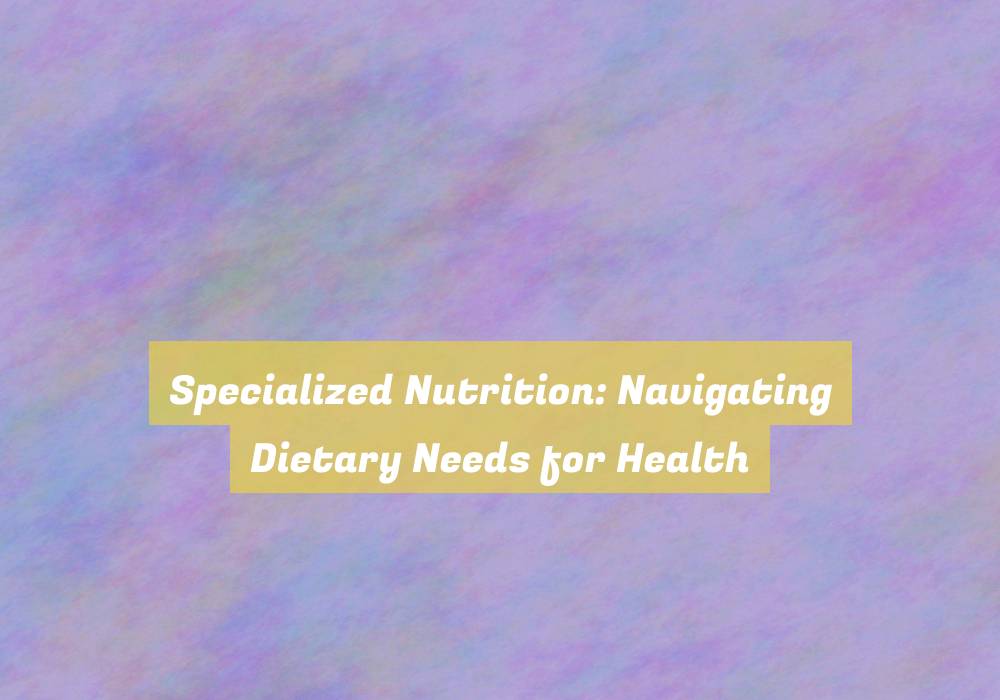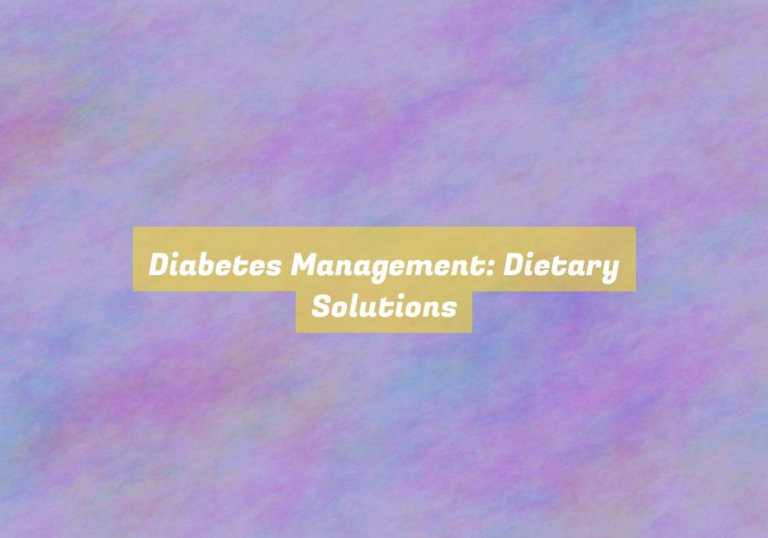Specialized Nutrition: Navigating Dietary Needs for Health
You may think that navigating specialized nutrition is too complex and overwhelming, especially when it comes to addressing specific dietary needs for your health.
However, understanding how to tailor your nutrition to manage medical conditions, food allergies, and intolerances can significantly impact your overall well-being.
From creating strategies for optimal health through nutrition to learning how to adapt your diet to various health concerns, there are practical ways to approach specialized nutrition that can make a real difference in your life.
So, are you ready to discover how you can take charge of your health through personalized dietary choices?
Understanding Specialized Dietary Needs
Understanding your specialized dietary needs is crucial for maintaining optimal health and well-being. EveryoneG??s body is unique, and what works for one person may not work for another. ItG??s essential to identify any specific dietary requirements you may have, whether itG??s due to food allergies, intolerances, or medical conditions. Consulting with a healthcare professional or a registered dietitian can help you determine what foods and nutrients your body needs to function at its best.
By understanding your specialized dietary needs, you can make informed decisions about the foods you consume. For example, if you have celiac disease, youG??ll need to avoid gluten-containing foods to prevent damage to your intestines. Similarly, individuals with lactose intolerance should be mindful of their dairy intake to prevent digestive issues. By being aware of your specific dietary needs, you can tailor your eating habits to support your overall health and well-being.
ItG??s also important to stay informed about nutritional developments and research related to your specialized dietary needs. As scientific understanding evolves, new dietary recommendations and strategies may emerge, providing you with the opportunity to further optimize your nutritional intake.
Tailoring Nutrition for Medical Conditions
If you have a medical condition, tailoring your nutrition to support your health is essential for managing your symptoms and promoting overall well-being.
For individuals with diabetes, controlling carbohydrate intake and monitoring blood sugar levels are crucial. A diet rich in fruits, vegetables, whole grains, lean proteins, and healthy fats can help manage blood sugar levels and reduce the risk of complications.
If you have high blood pressure, limiting sodium intake and focusing on potassium-rich foods like bananas, oranges, and sweet potatoes can be beneficial.
For those with celiac disease, avoiding gluten-containing foods such as wheat, barley, and rye is necessary to prevent damage to the small intestine.
Additionally, individuals with lactose intolerance can benefit from lactose-free or low-lactose alternatives to ensure adequate calcium intake without discomfort.
If you have a medical condition that affects your digestion, such as irritable bowel syndrome, incorporating high-fiber foods and avoiding trigger foods like certain spices or high-fat meals can help manage symptoms.
Managing Food Allergies and Intolerances
Dealing with food allergies and intolerances can significantly impact your daily life and require careful attention to the foods you consume. Allergies involve the immune systemG??s reaction to specific proteins in food, triggering symptoms that can range from mild hives to severe anaphylaxis. Intolerances, on the other hand, result from the bodyG??s inability to properly digest certain components of food, often leading to digestive discomfort. Both allergies and intolerances necessitate a diligent approach to managing your diet.
To effectively manage food allergies and intolerances, itG??s crucial to become adept at reading food labels and identifying potential allergens or irritants. You may need to meticulously plan your meals and snacks, especially when dining out or traveling. This can involve communicating your dietary needs to restaurant staff or preparing your own food to ensure safety. Additionally, seeking out alternative ingredients and cooking methods can help you enjoy a diverse and satisfying diet while avoiding problematic foods.
Consulting with a healthcare professional or registered dietitian is essential for creating a personalized dietary plan that meets your nutritional needs while steering clear of allergens and intolerances. They can provide guidance on ensuring adequate nutrient intake and offer support in navigating the intricacies of specialized nutrition.
Strategies for Optimal Health Through Nutrition
Navigating specialized nutrition due to food allergies and intolerances can be challenging, but by implementing strategic dietary choices, you can optimize your health and well-being.
One essential strategy is to focus on whole, unprocessed foods. These foods are rich in nutrients and are less likely to contain allergens or irritants.
Additionally, paying attention to food labels and ingredients can help you avoid potential allergens.
Another crucial aspect is to work with a healthcare professional or a registered dietitian to develop a personalized nutrition plan that meets your individual needs. They can provide guidance on alternative food options and ensure that youG??re meeting your nutritional requirements.
Furthermore, keeping a food diary can help track your symptoms and identify potential triggers, allowing you to make informed decisions about your diet.
Lastly, donG??t underestimate the power of meal planning. By planning your meals ahead of time, you can ensure that you have safe and nutritious options readily available, reducing the likelihood of consuming foods that may cause adverse reactions.
These strategies can play a significant role in improving your overall health and quality of life.
Conclusion
Overall, understanding specialized dietary needs and tailoring nutrition to individual medical conditions is crucial for optimal health.
Managing food allergies and intolerances is also important for maintaining a balanced diet.
By following these strategies, you can navigate your dietary needs and ensure that youG??re getting the proper nutrition for your body.
Remember to consult with a healthcare professional or registered dietitian to develop a personalized nutrition plan that meets your specific needs.







